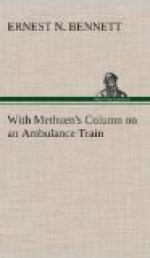By the time we reached Richmond Road the usual influx of private offerings for the wounded had, as usual, begun. We always left the front with the ordinary comforts of an ambulance train; by the time we reached Capetown we looked like a sort of cross between a green-grocer’s stall and a confectioner’s shop. We simply didn’t know what to do with the masses of fruit and flowers, puddings and jellies, which the people along the line forced upon us. These kindly folk—men, women and children—thrust their various offerings through the windows; then they peeped through themselves, and the women would say “poor dear” to some six-foot guardsman, who smiled his thanks or told them how he got hit. As I say, the train was, by the time we reached Wynberg, simply choked with luxuries—some of them quite unsuitable for wounded men—a veritable embarras de richesses. We used to begin the journey with moderation and end it with a species of debauch! But it was most kind and thoughtful of these colonists all the same.
By the time we reached Wynberg on 16th December it was quite dark. A row of ambulance waggons stood ready beyond the platform, and in front of them a line of St. John’s Ambulance men, fresh from England, looking very spruce and neat. The wounded were speedily conveyed to the waggons and safely lodged in the hospital. On a former occasion one poor fellow died at the moment he was being lifted out of the train. My comrades and myself had had about six hours’ sleep in three consecutive nights, and after we had remade the beds and swept the train we slept soundly. Next morning we were on duty till twelve, when we were allowed a few hours’ leave. A warm bath and a lunch at the Royal Hotel with a good bottle of wine was very welcome, and we were all in excellent spirits when the whistle sounded and we steamed away once more to the north with 600 miles before us.




